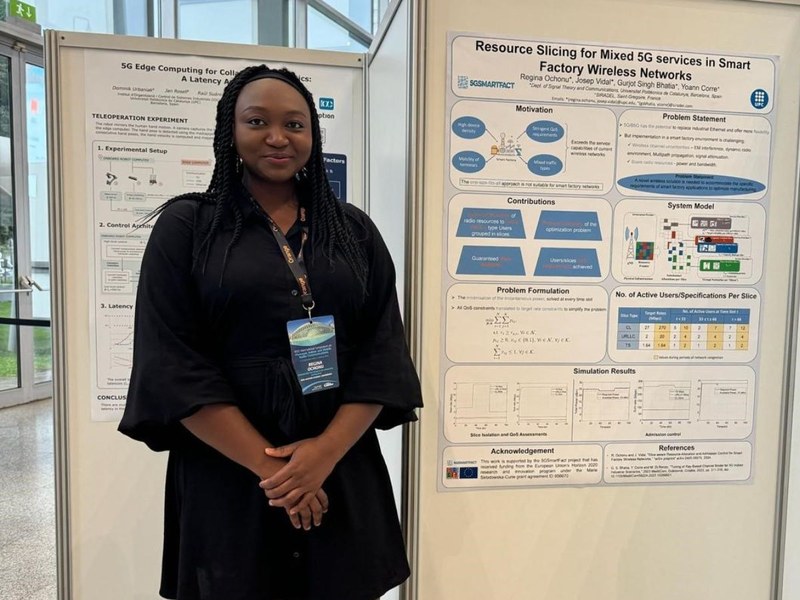5GSmartFact: Slicing for 5G dense radio networks in smart factories, by UPC PhD Student Regina Ochonu
21/07/2025
5GSmartFact is an MSCA-ITN project funded by the EU whose objective is to work at the crossroads of factory
automation and 5G evolution. We aim for a complete redesign of robot architectures that will lead to a leap
forward in the industry automation.
The project started in March 2021.
14 PhD students were hired at the beginning of the project, with different kinds of backgrounds (robotics,
telecom engineering, …) and complementary PhD projects related with wireless communications and robotics.
ESR (upc.edu).
Regina Ochonu is one of the 5GSmartFact ESRs pursuing her doctoral studies at the Universitat Politècnica de
Catalunya (UPC), Spain, under the supervision of Professor Josep Vidal. Her research focuses on slicing for 5G
dense radio networks in smart factories.
She has developed a suite of slice-aware resource allocation frameworks designed for uplink and downlink
communications in multiuser TDD-OFDMA systems, specifically targeting smart factory applications. The
proposed approach introduces novel frameworks that jointly optimize power allocation and subcarrier
assignment, with the downlink framework minimizing total transmission power while adhering to user-specific
QoS constraints, and the uplink framework implementing power control to achieve equalized received SNR
across users within strict power budgets. A key innovation is the unified reformulation approach that transforms
diverse QoS constraints—including latency, reliability, jitter, and throughput requirements—into equivalent
rate-based expressions, enabling the application of convex optimization techniques for computationally efficient
solutions. The system incorporates a power-aware admission control mechanism that dynamically redistributes
user rates based on channel conditions and network load, ensuring throughput preservation for best-effort
slices while simultaneously satisfying the stringent requirements of high-priority slices like URLLC and time-
sensitive slices. Additionally, the framework features a dynamic TDD slot allocation mechanism that adjusts
downlink / uplink time splits in real-time, optimizing resource utilization and effectively balancing traffic
asymmetries in heterogeneous service environments with mixed traffic patterns. The system model of the
framework is as shown.
Fig. 1. System model of the slice-aware resource allocations framework for smart factory wireless networks.

A second aspect of her work is Machine Learning (ML) - based predictive handover decision framework for 3GPP networks to optimize seamless connectivity and ensure deterministic communication in 5G and beyond networs. The research addresses the limitations of traditional handover mechanisms (including basic handover, Conditional Handover, and Dual Active Protocol Stack handover) by leveraging the newly introduced Lower Layer Triggered Mobility (LTM) in 3GPP Release 18, which enables serving cell changes via L1/L2 signaling while maintaining upper layer configurations to reduce latency and interruption time. The key contribution is an adaptive handover decision technique based on ML prediction of Reference Signal Received Power (RSRP) values, which predicts future channel states between user equipment (UE)s and neighboring gNBs to make more informed handover decisions rather than relying on traditional hysteresis-based approaches. The proposed method captures correlations in L3-filtered measurements due to pathloss and shadowing while removing residual multipath fading components, with prediction time lags optimized based on UE speeds.
Regina’s research was done in collaboration with two industry partners of the 5GSmartFact project; Siradel (Rennes, France) and Nokia (Aalborg, Denmark).
To know more:
[1] R. Ochonu and J. Vidal, "Slice-aware Resource Allocation and Admission Control for Smart Factory Wireless Networks," 2024 IEEE 100th Vehicular Technology Conference (VTC2024-Fall), Washington, DC, USA, 2024, pp. 1-7, doi: 10.1109/VTC2024-Fall63153.2024.10757564.
[2]
Additional picture:

Coordinator: Josep Vidal, UPC.
Consortium
5GSmartFact features a selected consortium of academia (Universitat Politècnica de Catalunya, Aalborg University), research centres (i2Cat, CNRS: Centre National pour la Recherche Scientifique), 5G companies (NEC, Nokia, Siradel) and expert companies in factory automation (ABB, Robert Bosch, Ingeniarius, Roboception), together with supporting institutions (Universidade de Coimbra, Université Paris-Saclay).
Funded by EU within the MSCA ITN program
Project website

Comparteix: